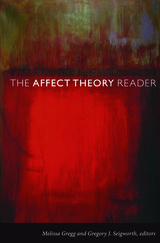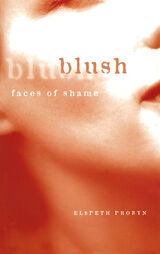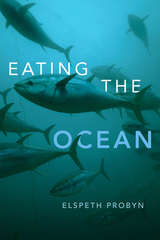3 books about Probyn, Elspeth

The Affect Theory Reader
Melissa Gregg and Gregory J. Seigworth, eds.
Duke University Press, 2010
This field-defining collection consolidates and builds momentum in the burgeoning area of affect studies. The contributors include many of the central theorists of affect—those visceral forces beneath, alongside, or generally other than conscious knowing that can serve to drive us toward movement, thought, and ever-changing forms of relation. As Lauren Berlant explores “cruel optimism,” Brian Massumi theorizes the affective logic of public threat, and Elspeth Probyn examines shame, they, along with the other contributors, show how an awareness of affect is opening up exciting new insights in disciplines from anthropology, cultural studies, geography, and psychology to philosophy, queer studies, and sociology. In essays diverse in subject matter, style, and perspective, the contributors demonstrate how affect theory illuminates the intertwined realms of the aesthetic, the ethical, and the political as they play out across bodies (human and non-human) in both mundane and extraordinary ways. They reveal the broad theoretical possibilities opened by an awareness of affect as they reflect on topics including ethics, food, public morale, glamor, snark in the workplace, and mental health regimes. The Affect Theory Reader includes an interview with the cultural theorist Lawrence Grossberg and an afterword by the anthropologist Kathleen Stewart. In the introduction, the editors suggest ways of defining affect, trace the concept’s history, and highlight the role of affect theory in various areas of study.
Contributors. Sara Ahmed, Ben Anderson, Lauren Berlant, Lone Bertelsen, Steven D. Brown, Patricia Ticineto Clough, Anna Gibbs,Melissa Gregg, Lawrence Grossberg, Ben Highmore, Brian Massumi, Andrew Murphie, Elspeth Probyn, Gregory J. Seigworth, Kathleen Stewart, Nigel Thrift, Ian Tucker, Megan Watkins
[more]

Blush
Faces of Shame
Elspeth Probyn
University of Minnesota Press, 2005
With the rise of pride - national pride, gay pride, black pride, fat pride - shame, the "sickness of the soul," has acquired a bad reputation. While the repudiation of some forms and consequences of societal shame are undoubtedly necessary, Elspeth Probyn contends that this emotion is a powerful resource in rethinking who we are and who we want to be. When we blush, we are driven to question what we value about ourselves and why. Blush argues that we are all born with a capacity for shame, much as we are born with the capacity for anger or pride, and that shame, like these other emotions, can be good for us and reveal the good in us. Painfully introspective, shame demands that we question our actions and our relationship to others. Shame's physical manifestation - the blush - gives us away, connecting us to our humanity. What shames us says a great deal about our character as individuals and as a society, about our past and our desires for the future. Written in an engaging and personal style, Blush combines psychology and cultural criticism, sociology and popular science, to present a unique perspective on debates about the ethics and emotion of identity.
[more]

Eating the Ocean
Elspeth Probyn
Duke University Press, 2016
In Eating the Ocean Elspeth Probyn investigates the profound importance of the ocean and the future of fish and human entanglement. On her ethnographic journey around the world's oceans and fisheries, she finds that the ocean is being simplified in a food politics that is overwhelmingly land based and preoccupied with buzzwords like "local" and "sustainable." Developing a conceptual tack that combines critical analysis and embodied ethnography, she dives into the lucrative and endangered bluefin tuna market, the gendered politics of "sustainability," the ghoulish business of producing fish meal and fish oil for animals and humans, and the long history of encounters between humans and oysters. Seeing the ocean as the site of the entanglement of multiple species—which are all implicated in the interactions of technology, culture, politics, and the market—enables us to think about ways to develop a reflexive ethics of taste and place based in the realization that we cannot escape the food politics of the human-fish relationship.
[more]
READERS
Browse our collection.
PUBLISHERS
See BiblioVault's publisher services.
STUDENT SERVICES
Files for college accessibility offices.
UChicago Accessibility Resources
home | accessibility | search | about | contact us
BiblioVault ® 2001 - 2024
The University of Chicago Press









